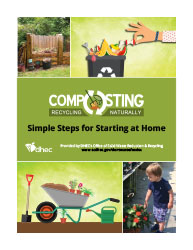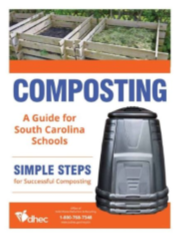Composting is simply the slow, natural decomposition of organics. Composting at home is the controlled and faster decomposition of organics such as yard trimmings and food waste generated by you and your family. Microorganisms break down this material into a nutrient-rich soil amendment or mulch that can be used in yards, gardens and potted plants.
Composting is a beneficial and inexpensive way to manage your organic waste. It involves little effort, equipment and expertise. You can do it.
Why compost?
Yard trimmings and food waste make up about 30 percent of what South Carolinians throw away every year. Composting at home diverts that material from the landfill and turns it into a valuable product. It can improve the soil, prevent erosion and reduce the use of fertilizer, pesticides and water – saving you money – and help protect the environment by conserving resources.
Need help? Have questions?
Composting at Home
Residents have many home composting options from vermicomposting projects to food digesters to backyard composting with bins. Composting: Recycling Naturally is a guidebook that provides information on those options and simple steps for starting at home. Many local governments also offer workshops, often with opportunities to buy compost bins at reduced prices or at cost. To see what is available in your community, find and contact your county recycling coordinator.
Composting at School
Schools can also set up composting programs in various ways including on-site (like backyard composting), through a contracted commercial composter or in a classroom project like vermicomposting. Composting: A Guide for South Carolina Schools is a guidebook that provides information on those options and simple steps for starting at school. This guide is also great for kids wanting to start backyard composting at home and includes kid-friendly charts and diagrams.


